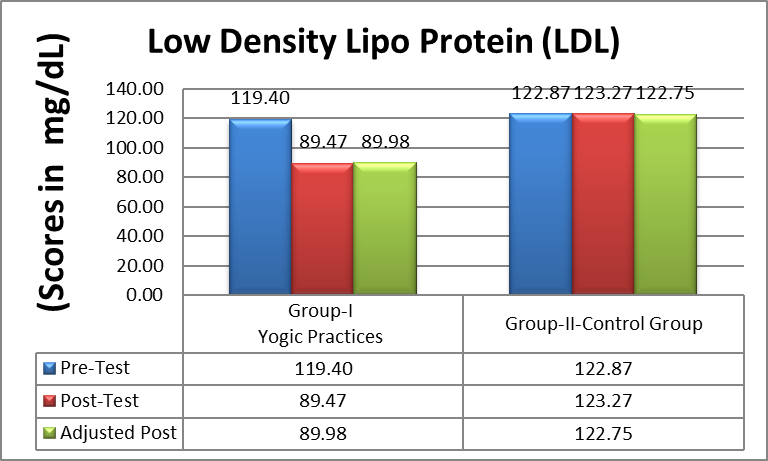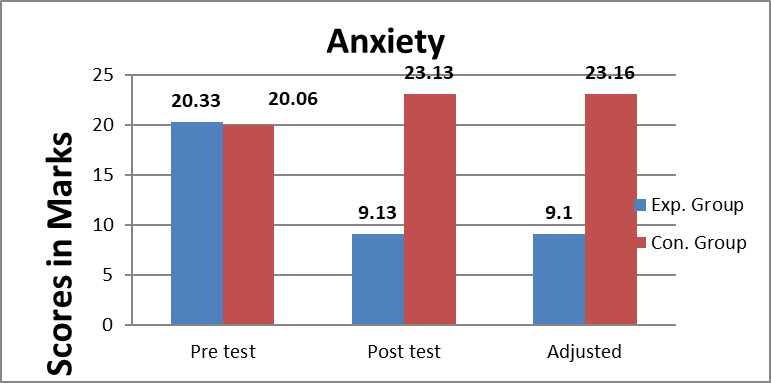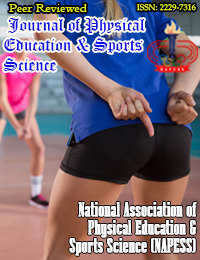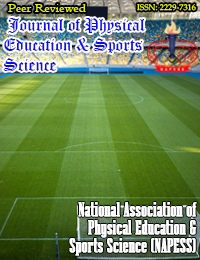EFFECT OF YOGIC PRACTICES ON LOW DENSITY LIPOPROTEIN AND ANXIETY AMONG MIDDLE AGED OBESE MEN
Download PDF
The purpose of the random group experimental study was to find out the effect of yogic practices on Low Density Lipoprotein and Anxiety among Middle aged obese Men. For the purpose of the study, 30 Middle aged obese Men were selected randomly using random sampling method from Chennai between the age group of 40 and 50 years and they were divided into two groups I, and II with 15 subjects each. It was hypothesized that there would be significant differences among the Middle aged obese Men on selected Biochemical and psychological variables such as Low Density Lipoprotein(LDL) and Anxiety than the control group. Preliminary test was conducted for two Groups on Anxiety and Adjustment before the start of the training program. Group I subjects were given Yogic practices for 60 minutes, six days a week for a total period of 12 weeks. Group II (Control Group) were in active rest. After the experimental period, the two groups were retested again on the same selected dependent variables. Analysis of co-variance (ANCOVA) was used to find out the significant differences between the experimental group and the control group. The test of significance was fixed at 0.05 level of confidence. The results of the study proved that the Experimental Group showed significant differences on selected Biochemical and psychological variables such as Low Density Lipoprotein (LDL) (decreased) and Anxiety (reduced) than the Control Group due to Yogic practices among Middle aged obese Men. The hypothesis was accepted at 0.05 level of confidence. Hence it is concluded that Yogic practices are beneficial to the Middle aged obese Men to decrease Low Density Lipoprotein (LDL) and to overcome Anxiety.
EFFECT OF YOGIC PRACTICES ON LOW DENSITY LIPOPROTEIN AND ANXIETY AMONG MIDDLE AGED OBESE MEN
*A. ANNADURAI ** Dr. R. ELANGOVAN, *Assistant Professor, Faculty of Yoga Sciences and Therapy, Meenakshi Academy of Higher Education and Research (Deemed to be University), No.12, Vembuliamman Koil Street, West K.K.Nagar, Chennai-78, Tamil Nadu, India. E- Mail ID: annaduraiyoga@gmail.com **Professor & Head, Faculty of Yoga Sciences and Therapy, Meenakshi Academy of Higher Education and Research (Deemed to be university), No.12, Vembuliamman Koil Street, West K.K.Nagar, Chennai-78, Tamil Nadu, India. E-Mail ID: relangovantnpesu@gmail.com.
ABSTRACT
The purpose of the random group experimental study was to find out the effect of yogic practices on Low Density Lipoprotein and Anxiety among Middle aged obese Men. For the purpose of the study, 30 Middle aged obese Men were selected randomly using random sampling method from Chennai between the age group of 40 and 50 years and they were divided into two groups I, and II with 15 subjects each. It was hypothesized that there would be significant differences among the Middle aged obese Men on selected Biochemical and psychological variables such as Low Density Lipoprotein(LDL) and Anxiety than the control group. Preliminary test was conducted for two Groups on Anxiety and Adjustment before the start of the training program. Group I subjects were given Yogic practices for 60 minutes, six days a week for a total period of 12 weeks. Group II (Control Group) were in active rest. After the experimental period, the two groups were retested again on the same selected dependent variables. Analysis of co-variance (ANCOVA) was used to find out the significant differences between the experimental group and the control group. The test of significance was fixed at 0.05 level of confidence. The results of the study proved that the Experimental Group showed significant differences on selected Biochemical and psychological variables such as Low Density Lipoprotein (LDL) (decreased) and Anxiety (reduced) than the Control Group due to Yogic practices among Middle aged obese Men. The hypothesis was accepted at 0.05 level of confidence. Hence it is concluded that Yogic practices are beneficial to the Middle aged obese Men to decrease Low Density Lipoprotein (LDL) and to overcome Anxiety.
KEY WORDS: Yogic practices, Low Density Lipoprotein (LDL), Anxiety.
INTRODUCTION
Today the whole world is looking towards yoga for answers to the various problems the modern man is facing. Yoga is a way of life. It is an integrated system of education for the body, mind and inner spirit. This art of right living was perfected and practiced in India thousands of years ago but, as yoga deals with universal truths, its teachings are valid today as they were in the ancient times. Yoga is union with all. It brings peace to the human beings by physical practices with or without a toner on spiritualism. As we live in the age of modern science and technology, our lifestyle has become very fast resulting in obesity. It is also becoming very hard and difficult to live a natural and normal life because of Obesity. The very air is becoming unfit for human consumption. Our cities are growing noisier, dirtier and congested. All these do create tension. The mind is always under strain due to various social evils. When we are under stress, our digestion is not proper and we may suffer from some fairly serious ailments like Asthma and Spondylitis etc., and yoga comes to our rescue at this juncture. In the treatment of almost all the chronic disorders and ailments, yoga can assist in a big way, when practiced along with other streams of treatment.
Obesity is associated with a range of serious physical and psychosocial consequences. Physical complications include pulmonary, Oorthopedic, Nneurological, gastroenterological, endocrine, and cardiovascular disorders. The psychosocial consequences of overweight and obesity include increased isolation and teasing, lower self-esteem, anxiety and adjustment. Yoga helps to overcome obesity related issues.
OBJECTIVE OF THE STUDY
The objective of the study was to find out whether there would be any significant difference on selected Psychological variables such as Anxiety and Adjustment among middle aged obese Men.
PURPOSE OF THE STUDY
The purpose of the study was to find out the effect of Yogic practices on Low Density Lipoprotein (LDL) and Anxiety among middle aged obese Men.
HYPOTHESIS
It was hypothesized that there would be significant differences due to Yogic practices on selected Biochemical and psychological variables such as Low Density Lipoprotein(LDL) and Anxiety than the control group among middle aged obese Men.
DELIMITATIONS
- The study was confined to middle aged obese Men from Chennai City, India only.
- The age of the subject was ranged from 40 to 50 years only.
- The study was confined to yogic practices as independent variable only
- The study was confined to Low Density Lipoprotein (LDL) and Anxiety as dependent variables only.
LIMITATIONS
- The Factors like Socio-Economical status were not taken into consideration.
- The climatic conditions were not considered.
- Factors like Life style habits were not taken into consideration.
- Subjects’ day to day activities were not taken into account.
- Diet and Medication followed by subjects was not controlled.
REVIEW OF RELATED LITERATURE
Thippeswamy B et.al.,(2018) studied 24 weeks of yogic practices on lipid profile among obese men belonging to Malnad region. The subjects were equally divided to Experimental and Control group, age ranging between 35 to 55 years. The data on lipid profile was collected by means of blood sample collection and hematological analysis in a laboratory setting by a qualified lab technician twice i.e pre and post-test conditions. Yoga training module was given to experimental group. It was observed and concluded that all the aspects of lipid profile significantly decreased due to 24 weeks of yogic practices.
Dhananjai et.al., (2013) aimed this study to evaluate the effects of Yogic Practice on anxiety/depression associated with obesity. 272 subjects were from the Department of Physiology, C.S.M. Medical University (erstwhile KGMU), Lucknow, Uttar Pradesh, India and were divided into two groups of 205 subjects (with yogic practice) and a control group of 67 subjects (with aerobic exercise). Assessment of anxiety and depression were done by Hamilton Rating Scale. This study concluded that yogic practices especially asana including in the treatment/therapy is beneficial to overcome anxiety and depression.
METHODOLOGY
To achieve the purpose of the study, 90 came forward, 60 were screened and 30 middle aged obese men were selected randomly from Chennai city, between the age group of 40 and 50 years and they were divided into two groups I and II with 15 subjects in each group. Preliminary test was conducted for the two groups (I and II) on the selected dependent variables before the start of the training program. Group I subjects were given Yogic practices for 60 minutes , six days in a week for a total period of 12 weeks.
. The yogic practices given to experimental group include Starting prayer, Loosening the joining, Suryanamakar,Tadasana, Trikonasana,Ardhakatichakrasana,Paschimottasana, Ustrasana, Ardhamatsyendrasana, Bhujangasana, Salabasana, Dhanurasana,Navasana, Sarvangasana, Savasana, Surya Bhedhana, Nadi shudhi,Kapalabati, and Yoga Nidra (Relaxation) Techniques. Initially pre-test was taken and after the experimental period of 12 weeks, post-test was conducted for the two groups on selected Biochemical and Psychological Variables. Analysis of Covariance (ANCOVA) was used to find out the difference among the experimental group and control groups. The test of significance was fixed as 0.05 level of confidence.
RESULTS AND DISCUSSION
The pre and post test scores were subjected to statistical treatment using ANCOVA to test the significance of the effect of yogic practices. In all cases 0.05 level was fixed as significant level. These are shown in the Tables below.
RESULTS ON LOW DENSITY LIPOPROTEIN (LDL)
Table I
ANALYSIS OF CO-VARIANCE RESULTS ON EFFECT OF YOGIC PRACTICES AMONG OBESE MIDDLE AGED MEN ON LOW DENSITY LIPOPROTEIN (LDL) (Scores in mg/dL)
|
Tests/ Groups |
EX. GR-I |
CG - II |
SV |
Sum of Squares |
Df |
Mean Squares |
“F” Ratio |
||||
|
Pre Test |
119.40 |
122.87 |
B |
90.13 |
1 |
90.13 |
1.26 |
||||
|
W |
2009.33 |
28 |
71.76 |
||||||||
|
Post Test |
89.47 |
123.27 |
B |
8568.30 |
1 |
8568.30 |
251.83* |
||||
|
W |
952.67 |
28 |
34.02 |
||||||||
|
Adjusted Post Test |
89.98 |
122.75 |
B |
7707.68 |
1 |
7707.68 |
268.58* |
||||
|
W |
774.85 |
27 |
28.70 |
||||||||
* Significant at 0.05 level of confidence. (Table F ratio at 0.05 level, of confidence for df 1 and 28= 4.2, 1and 27= 4.21)
The obtained F value of 251.83 was greater than the required F value to be significant 4.20 and hence, there was significant difference. Thus, it was proved that experimental group gained mean difference on Low Density Lipoprotein (LDL) 268.58 was due to yogic practices given to middle aged Obese men in line with the study conducted by Thippeswamy B et.al.,(2018).
The initial, post and adjusted means values of experimental and control group on Low Density Lipoprotein is presented in Figure 1 for better understanding of the results of this study.
Figure 1
BAR DIAGRAM SHOWING THE MEAN DIFFERENCES AMONG THE GROUPS ON LOW DENSITY LIPOPROTEIN (LDL) (Scores in mg/dL)
* Significant at 0.05 level of confidence. (Table F ratio at 0.05 level, of confidence for df 1 and 28= 4.2, 1and 27= 4.21)
RESULTS ON ANXIETY
The initial and final means on yogic practices group and control group on adjustment among obese middle aged Men and the obtained results is presented in Table II.
Table II
ANALYSIS OF COVARIANCE RESULTS ON EFFECT OF YOGIC PRACTICES AMONG OBESE MIDDLE AGED MEN ON ANXIETY (in Scores)
|
Tests/ Groups |
EX. GR-I |
CG - II |
SV |
Sum of Squares |
Df |
Mean Squares |
“F” Ratio |
|
Pre test |
20.33 |
20.06 |
between |
0.53 |
2 |
0.53 |
0.06 |
|
Within |
242.26 |
28 |
8.65 |
||||
|
Post test |
9.13 |
23.13 |
between |
1470 |
2 |
735 |
94.63* |
|
Within |
217.46 |
28 |
7.76 |
||||
|
Adjusted |
9.10 |
23.16 |
between |
1479.76 |
2 |
739.88 |
97.71* |
|
Within |
204.43 |
27 |
7.57 |
* Significant at 0.05 level of confidence. (Table F ratio at 0.05 level, of confidence for df 1 and 28= 4.2, 1and 27= 4.21)
The obtained F value 94.63 was greater than the required table F value of 4.05 and hence it is significant at 0.05 level of confidence. Thus, it was proved that experimental group gained mean difference on, Anxiety 11.2 was due to yogic practices given to middle aged obese men in line with the study conducted by Dhananjai et.al., (2013).
The initial, post and adjusted means values of experimental and control group on Anxiety is presented in Figure 2 for better understanding of the results of this study.
Figure II
Bar Diagram Showing Initial, Final and Adjusted Means on Anxiety of Experimental and Control Group (in Scores)

* Significant at 0.05 level of confidence. (Table F ratio at 0.05 level, of confidence for df 1 and 28= 4.2, 1and 27= 4.21)
The results of the study showed that Low Density Lipoprotein (LDL) and Anxiety decreased significantly due to Yogic practices for Group-I than Group II. Hence the hypothesis was accepted at 0.05 level of confidence.
The above findings were also substantiated by the observations made by experts such as Thippeswamy B et.al.,(2018) and Dhananjai et.al., (2013).
DISCUSSION ON HYPOTHESIS
It was hypothesized that there would be significant differences on selected Biochemical and Psychological variables such as Low Density Lipoprotein (LDL) and Anxiety due to yogic practices among middle aged obese men than the control group. The results proved that there were significant differences on Low Density Lipoprotein (LDL) (Decreased) and Anxiety (Reduced) due to yogic practices than the control group among middle aged obese men. Hence, the hypothesis was accepted at 0.05 level of confidence.
CONCLUSION
It was concluded that yogic practices decreased Low Density Lipoprotein (LDL) and reduced Anxiety significantly among middle aged Obese men. Hence, yogic practices are beneficial to middle aged obese men to maintain healthy Low Density Lipoprotein (LDL) and to overcome Anxiety.
REFERENCES
- Thippeswamy B, Appanna M Gasti and Gajanana Prabhu B Effect of 24 weeks yogic practices on lipid profile of obese men in Malnad International Journal of Yogic, Human Movement and Sports Sciences 2018; 3(2): 292-294
- Dhananjai S, Sadashiv, Tiwari S, Dutt K, Kumar R. Reducing psychological distress and obesity through Yoga practice. Int J Yoga [serial online] 2013 [cited 2021 Feb 17];6:66-70. Available from: https://www.ijoy.org.in/text.asp?2013/6/1/66/105949
- Elangovan R (2016), Fundamentals of Yoga, Chennai: Ashwin Publications, P.31.Garde R K (1984), “Principles and Practice of Yoga Therapy”, Mumbai, R J Taraporevala,
WEBSITES
- www.who.com
- www.yoga point .com
- www.ncbi.org.in
- www.onlinelibrary.wiley.com

















